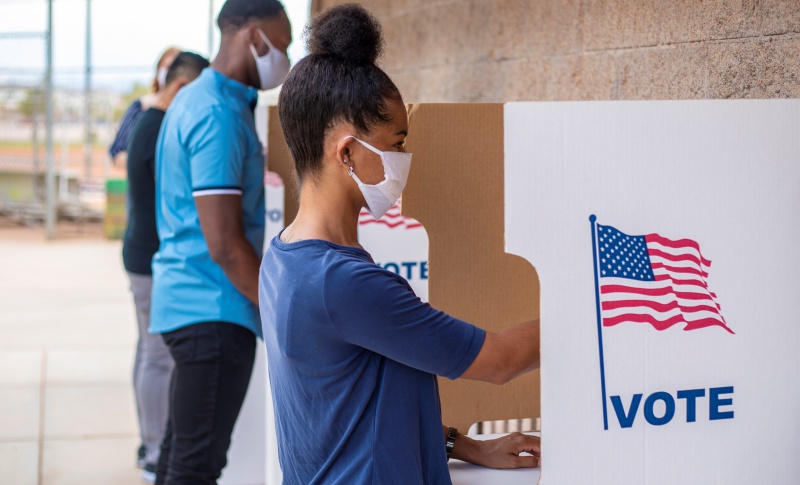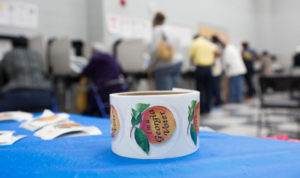
Scholars urge the Senate to pass comprehensive voting rights legislation.
A bill sits before the U.S. Senate that could provide the greatest voting rights protections seen in decades. But will the Senate pass it?
According to scholars at the nonpartisan Brennan Center for Justice, the Senate must.
The Brennan Center, a think tank focused on the U.S. legal system, recently issued a report authored by the Center’s Wendy Weiser, Daniel Weiner, and Dominique Erney. It urges Congress to enact the For the People Act—a bill the report states will meet the nation’s focus on racial justice at a time when democracy is under siege.
Now, states across the country are moving to restrict voting rights laws at a rapid pace. Texas leads the way with 49 bills introduced, followed by Georgia and Arizona with 25 and 23 bills, respectively. Of the bills signed into law, Georgia Senate Bill 202 incorporates some of the most comprehensive voting restrictions, including stringent voter ID laws, reduced early voting opportunities, and restricted access to drop boxes. The bill even criminalizes providing water to voters waiting in line to vote—lines that are notoriously long, and often hot.
Current barriers to equitable voting rights—such as voter registration hurdles, voter purges, felony disenfranchisement, and partisan gerrymandering—largely target Black and brown voters. According to the Weiser and her coauthors, passing the bill would eliminate these barriers by modernizing the voting process throughout the United States. By passing this bill, the Senate would also strengthen campaign finance laws to prevent the power of the wealthy from eclipsing the voice of the many.
Weiser and her coauthors begin by addressing the gateway to voting—voter registration.
Before eligible citizens may cast their ballots, they must be registered voters. But the United States places the burden of registering and re-registering on its citizens. This process results in an error-prone system where nearly 13 percent of all registrations are incorrect. These errors, when combined with stringent state voting laws, often prevent eligible citizens from casting their votes on election day. And many voters do not realize the error until officials turn them away at the polls.
Weiser and her coauthors argue that passing the For the People Act would help remedy registration barriers by implementing automatic voter registration (AVR). AVR uses daily interactions with government agencies, such as the Department of Motor Vehicles or U.S. Department of Health & Human Services, to register eligible citizens automatically.
Streamlining registration through AVR provides more accurate registration information by replacing paper forms with an electronic system. This accuracy ensures that both voters and election officials know, with certainty, whether a voter is registered. Weiser and her coauthors state this level of certainty will protect eligible voters against the increasing threat of being turned away at the polls, or worse, voter purges.
Purges occur when election officials eliminate large groups of people from the registration lists by relying on often “flawed” data—flaws that, according to Weiser and her coauthors, result from the current paper registration system. But employing AVR would register 50 million eligible voters—the greatest expansion of voting rights since the 19th Amendment.
Electronic and automatic registration—when bolstered by nationwide same-day registration, early voting, and mail-in voting options—would eliminate significant barriers to voting often faced by communities of color.
Furthermore, passing the bill would end permanent felony disenfranchisement and explicitly prohibit partisan gerrymandering.
But securing the right to vote is only one prong of the overhaul of democracy proposed by the For the People Act. Reforming campaign finance laws, according to Weiser and her coauthors is also vital to protecting the integrity of elections.
Prior to Citizens United v. Federal Election Commission, a landmark U.S. Supreme Court case decided in 2010, long-standing election laws capped election spending. But the Court in Citizens United recognized the right of corporations and other groups to spend unlimited dollars on elections. Now, a small number of America’s wealthiest donors and special interest groups hold significant control over the outcome of both elections and policy outcomes, according to Weiser and her coauthors. They argue that this outsized influence begets deeper problems for equitable representation because powerful donors today are “overwhelmingly white and disproportionately male.”
Weiser and her coauthors assert that the bill’s small donor matching program would mitigate the effects of Citizens United. Small donor matching allows candidates to access federal funds if they comply with certain conditions, such as donor caps. For each small donation received, candidates receive federal funds six-times that of the amount of the small donation.
Using New York City as an example, Weiser and her coauthors show how small donor matching can increase the diversity of both the donor pool and the electoral candidates. After efforts to bolster representative diversity, including the small donor matching, the city elected its first Black mayor.
The For the People Act’s campaign finance reform would also include reforming the Federal Elections Commission (FEC). The FEC regulates electoral spending and is dedicated to protecting “the integrity of the federal campaign finance process.” But Weiser and her coauthors criticize the FEC’s structure as outdated to the point of creating an agency characterized by “dysfunction.”
Congress structured the FEC with care to safeguard its decisions against partisan overreach. Of the six FEC commissioners, only three can be from the same political party. But any official FEC action, such as issuing a new rule, requires four votes. According to Weiser and her coauthors, this structure causes gridlock because of today’s polarized politics.
And, this failure to regulate has resulted in an influence of dark money, foreign influence, and damaging lack of transparency to campaign contributions, according to Weiser and her coauthors.
By passing the For the People Act, the Senate would mitigate the FEC’s dysfunction by reducing the number of commissioners from six to five and reducing the cap on same-party commissioners to two, meaning the tie-breaking vote must be cast by an independent commissioner. The Senate would also empower the FEC’s staff to conduct investigations into alleged violations, strengthening the FEC’s enforcement mechanism.
Although the 2020 election is over, voter suppression remains. Weiser, Weiner, and Erney urge the Senate to remedy the present attacks on voting by passing this “groundbreaking legislation.” Only then, they say, will the country begin to reverse the damage done to American democracy in recent times.



